Fogarty community responds to COVID-19 in many ways
May / June 2020 | Volume 19, Number 3
As a result of the COVID-19 global pandemic, Fogarty grantees, trainees and fellows across geographic areas and research disciplines are shifting their focus to help address critical needs.
Updated July 16, 2020
Africa CDC: global response needed to end COVID-19
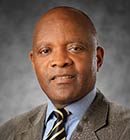
Dr. John N. Nkengasong
Director, Africa CDC
Africa’s investments in preparedness and response efforts to address Ebola, Lassa fever and HIV/AIDS have produced technical know-how that has been swiftly adapted to COVID-19, according to a recent article published in
Nature Medicine. However, senior author
Dr. John N. Nkengasong, director of Africa CDC and a former Fogarty trainee, said the continent cannot conquer coronavirus on its own. “Failure to cooperate globally and to act decisively in Africa will translate into sustained transmission and pose a risk to all. As acknowledged by world leaders: only victory in Africa can end the pandemic everywhere.”
GHESKIO is "facing the monster in Haiti"
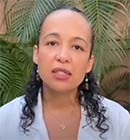
Dr. Vanessa Rouzier
GHESKIO
Advice for Low-income Countries on Managing Covid-19
- You are on your own. Pool resources and expertise from public and private institutions.
- Work with your ministry of health so that successful interventions can be shared and scaled up.
- Prevention messages must consider socioeconomic context.
- Grassroots community engagement is essential to gain public trust and fight stigma.
- Screening, testing, and care guidelines must be developed early and adapted rapidly as the pandemic evolves.
- Guidelines and training videos can be put online and rapidly distributed on social media.
- Suspect tuberculosis and Covid-19 coinfection in patients with chronic cough and sudden deterioration
Source: Table 1.
Correspondence: Facing the monster in Haiti. New England Journal of Medicine, June 16, 2020.
With the number of Haitians testing positive for COVID-19 doubling each week, the country is struggling to mount a response, with little international help, said
Dr. Vanessa Rouzier and GHESKIO colleagues in an article in the
New England Journal of Medicine. Misinformation is rampant and stigmatization is impeding care, Rouzier reported. The NIH-funded GHESKIO clinic suffered a fire in early June that compounded its difficulties.
Rouzier said shutting down commercial activity is not feasible in Haiti, given the extreme poverty, and presented guidance for others working in low-resource settings. “Haiti is susceptible to natural disasters and epidemics,” noted Rouzier. “But we are also resilient, creative, and relentless when faced with overwhelming challenges. We have overcome worse, and we will overcome COVID-19.”
Meanwhile,
GHESKIO Director and longtime Fogarty Dr. Jean “Bill” Pape has been named co-chair of Haiti’s Presidential Commission on COVID-19. He is also a member of the COVID-19 scientific body that is advising Haitian Prime Minister Joseph Jouthe.
Former Fogarty trainee at heart of China’s response

Dr. Zunyou Wu
Chinese CDC’s chief
epidemiologist
As chief epidemiologist of China’s CDC,
Dr. Zunyou Wu has been actively involved in the COVID-19 response in his country since the outset. “My primary responsibility is to monitor the epidemic of COVID-19 as it changes over time, assess the epidemic’s magnitude and predict future trends,” said Wu, a former Fogarty trainee. “We give guidance on analyzing data and preparing daily reports for understanding the epidemic.” In February, Wu participated in the WHO-China joint assessment of the pandemic and published a paper in
JAMA providing the early epidemiology of the outbreak, including a breakdown by gender, age, symptoms and fatality rate.
African Academy of Sciences promotes African involvement in COVID trials

Dr. Jerome Singh
AAS bioethics advisor
The African Academy of Sciences (AAS) has coordinated COVID-19 response activities across the continent, including launching an online platform to increase visibility of African clinical trial sites and investigators with the potential to participate in COVID-19 clinical trials. In a recent article in the
Journal of Infectious Diseases, AAS bioethics advisor and Fogarty grantee
Dr. Jerome Singh made the case that African involvement in COVID-19 research is essential. “As dozens of COVID-19 vaccine trials commence in the weeks and months ahead, African sites should be central to COVID-19 vaccine trial site mapping. Such an approach is in the interests of public health, scientifically responsible, and realizes key ethics values. Without such an approach, Africa risks being left behind in our response to the COVID-19 pandemic. This would be unconscionable.”
Peru struggles to social distance
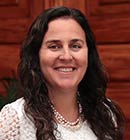
Dr. Patty Garcia
Cayetano Heredia
University
Peru confirmed its first COVID-19 patient on March 6 and 10 days later the government issued a complete lockdown, recalled Fogarty grantee and researcher at Cayetano Heredia University,
Dr. Patty Garcia. The restrictions were difficult for the country to take, she said, given their tradition of warm greetings and large gatherings. The authorities imposed a curfew to try to slow the pandemic’s spread. In an interview with Harvard’s public health school, Garcia described her role in the response. “I'm chairing a commission that has to do with innovations in technology for the response to COVID. So, in this commission, I work with about 16 scientists, and molecular biologists, engineers, et cetera. And we're trying to advise on how to do things better.”
AFREhealth shares best practices
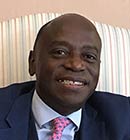
Dr. Jean Nachega
As the COVID-19 pandemic took hold globally, the African Forum for Research and Education in Health (AFREhealth) began convening a monthly video conference to share information and experiences among its collaborators. Topics have included updates on the virus, tips for addressing it in low-resource settings and country response case studies.
Dr. Jean Nachega, an AFREhealth principal investigator, has also led COVID-related publications on mitigation strategies tailored for Africa, caution regarding use of chloroquine and hydroxychloroquine, the potential for mobile health solutions and relevant lessons learned from combatting Ebola.
Fogarty grantees, trainees are at the forefront of coronavirus pandemic
In pandemic real-time,
Fogarty Fellow Andrew Kim, a Ph.D. candidate based at the
Health Economics and Epidemiology Research Office in South Africa, is examining the mental health impacts, perceptions and experiences of COVID-19 among families in Soweto. Kim and his research team are also conducting virtual ethnographic research to understand how people are responding to the effects of the pandemic on their daily lives. In addition, an impromptu surveillance system created by Kim’s group can identify mental health needs and then make appropriate referrals with help from South Africa’s largest mental health organization.
Current and former Fogarty Fellows
Drs. Sarah Lofgren, Matt Pullen and Caleb Skipper teamed up with their
mentor Dr. David Boulware to conduct a hydroxychloroquine clinical trial at the
University of Minnesota. The researchers studied post-exposure prophylaxis, preemptive treatment and pre-exposure prophylaxis of hydroxychloroquine. Published results proved the antimalarial drug did not prevent development of COVID-19 better than a placebo.
Dr. Keymanthri Moodley, Fogarty bioethics program grantee at Stellenbosch University, co-authored an article with
Former Fogarty trainee Dr. Jerome Singh of the University of KwaZulu-Natal for the
South African Medical Journal on the ethical considerations surrounding critical care triaging during the pandemic.
Dr. Malinee Neelamegam has partnered with the infectious diseases team at
University of Malaya (UM) to set up a COVID-19 hospital patient registry. The
Fogarty Fellow is also planning a clinical trial aimed at reducing use of ventilation for coronavirus patients admitted to the UM Medical Centre.
Dr. Zachary Porterfield, a
Fogarty Fellow at the
University of Kentucky, has developed four global collaboration projects to examine and translate COVID-related treatments. Acting as co-principal investigator, Porterfield has begun a clinical trial of a Japanese antiviral drug, camostat, at sites supervised by his own university and the
University of KwaZulu-Natal, in South Africa. Camostat, a serine inhibitor, has been shown to prevent cleavage of the spike protein in SARS-CoV-2, which is necessary for the virus to infect cells.
Dr. Kingsley Preko vice president of the Ghana Red Cross Society, donated food, sanitizers, masks and other supplies to the Ankaful prison to assist Ghana in the fight against COVID-19. Preko, a
former Fogarty bioethics program fellow and a senior lecturer at the
University of Cape Coast, said the humanitarian society also offered the government help with contact tracing.
Fogarty Fellow Dr. Alliya Qazi of Stanford University is collaborating with clinicians and researchers at
Addis Ababa University, Ethiopia, to develop guidelines for use of low-cost personal protective equipment in resource-limited settings during the COVID-19 pandemic. Specifically, the group is focusing on development and assessment of locally available protective equipment and locally appropriate recommendations for conservation of equipment.
Pennsylvania State University’s Dr. Steven Schiff has redirected his research to focus on neonatal infections. “It is clear to us that we know little of this new virus with respect to the spectrum of primary disease that it can generate in the infant,” according to the
Fogarty brain disorders program grantee. Explorations of co-infections must now expand to include the SARS-CoV-2 virus, he said. Schiff’s team is also collaborating with African and Asian colleagues to design mapping tools to track the evolving pandemic.
Fogarty Fellow Dr. Ashley Styczynski has partnered with the CDC and the
International Centre for Diarrhoeal Disease Research in Bangladesh to train hospital staff for triage and infection prevention and control during the coronavirus pandemic. Styczynski, a postdoctoral fellow at Stanford University, has also designed a survey of risk behaviors for coronavirus transmission in mosques, developed hand sanitizer holsters for healthcare workers and explored strategies for medical staff protection in resource-limited settings with limited personal protective equipment.
Coronavirus Anxiety:
Coping with Stress, Fear and Worry
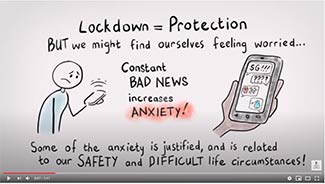
Courtesy of University of KwaZulu-Natal
Working with the Centre for Rural Health,
Dr. Ruwayda Petrus, a senior lecturer at the
University of KwaZulu-Natal, created a video that highlights healthy ways of dealing with fears and anxieties provoked by COVID-19. The Fogarty
MEPI Junior Faculty Fellow also contributed to an educational leaflet promoting psychological self-care that was created by University of Cape Town scientists. With Petrus’ help, this same team also developed two videos, one that trains frontline medical providers to cope with stress caused by the pandemic, the other showing health care managers new ways to support and debrief their staff based on psychodynamic principles.
Fogarty Scholar Dr. Karen Ann Alroy has been involved in COVID-19 pandemic response in a number of different roles, including providing communications at the New York City Department of Health and Mental Hygiene. She is also leading a population-based survey. “I am so deeply grateful for my experiences as a Fogarty Scholar in 2010-2011, and I often think about how well those experiences have trained me for my current career,” she said.
The UC San Diego lab where
Fogarty Fellow Dr. Gertrude Ecklu-Mensah works usually focuses on microbiome research but has now turned its attention to COVID-19. The lab is interested in unravelling SARS-CoV-2 dispersal dynamics, and how it interacts with microbial communities in the hospital environment. Hospital rooms and surfaces are swabbed before, during and after patients arrive. Samples are also being collected from patients, healthcare workers and the hospital environment.
Fogarty Global Infectious Disease research trainee Dr. Patricia V. Aguilar has been evaluating several compounds for their antiviral activities against SARS-CoV-2 as part of a team of investigators at the Galveston National Laboratory in Texas. The researchers are collaborating with industry partners and other academic investigators with the goal of identifying antivirals with the capacity to inhibit SARS-CoV-2 replication. They are also working to develop a thermostable inactivated vaccine candidate against SARS-CoV-2.
Fogarty mobile health grantee Dr. Haim Bau and his mentee Dr. Jinzhao Song, of the University of Pennsylvania have
published a preprint article about a single, two-stage, closed-tube molecular test for COVID-19 that can be used at home, in clinics or in other settings. The paper describes a rapid, highly sensitive, point-of-care, molecular test able to be used by people with minimal training. “Our test is based on loop mediated isothermal amplification (COVID-19 LAMP) and for higher sensitivity on nested nucleic acid, two stage isothermal amplification (COVID-19 Penn-RAMP),” they wrote. “Both tests can be carried out in closed tubes with either fluorescence or colorimetric (e.g., leuco crystal violet LCV) detection.” Song also has received a Fogarty International Scientist Development Award.
Fogarty trainee
Dr. Anna Maureen (Mau) Dungca-Lorilla is working on the front lines of the COVID-19 response in the Philippines. Dungca-Lorilla is a Fellow in the HIV and mental health research and training program in the Asia-Pacific region. She is practicing as a primary HIV care physician at the Research Institute for Tropical Medicine, Philippines.
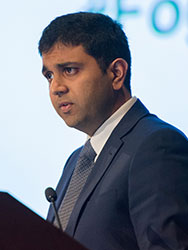
Dr. Vivek Naranbhai
Former Fogarty fellow Dr. Vivek Naranbhai, who is completing his chief residency at Massachusetts General Hospital, is working to describe and understand the epidemiology of COVID-19 in Boston and surrounding areas. He and his team are performing seroprevalence and nucleic acid testing in healthcare workers and adults in the community to understand the burden of asymptomatic infection, its determinants and natural history. This work may underpin efforts to understand herd immunity, correlates of protection and resource allocation.
Naranbhai said his Fogarty training “undoubtedly formed the intellectual foundation for the work we are pursuing in Boston.” Lessons learned from the HIV epidemic are “relevant now in responding to SARS CoV-2, including the need to understand the epidemic, challenges with marginalized communities, stigma around the disease and the urgency with which we need responses,” he explained. “The training in HIV lent itself well to responding, albeit in a different environment. The focus on public health in resource-limited settings during the Fogarty years and thereafter probably contributes to a perspective on the challenges of responding to the COVID-19 pandemic in the U.S., whose own resource constraints and fragility of the public health system was revealed during this epidemic.”
Naranbhai plans to return to his home country, South Africa, after completion of his residency in Boston.
More Information
To view Adobe PDF files,
download current, free accessible plug-ins from Adobe's website.